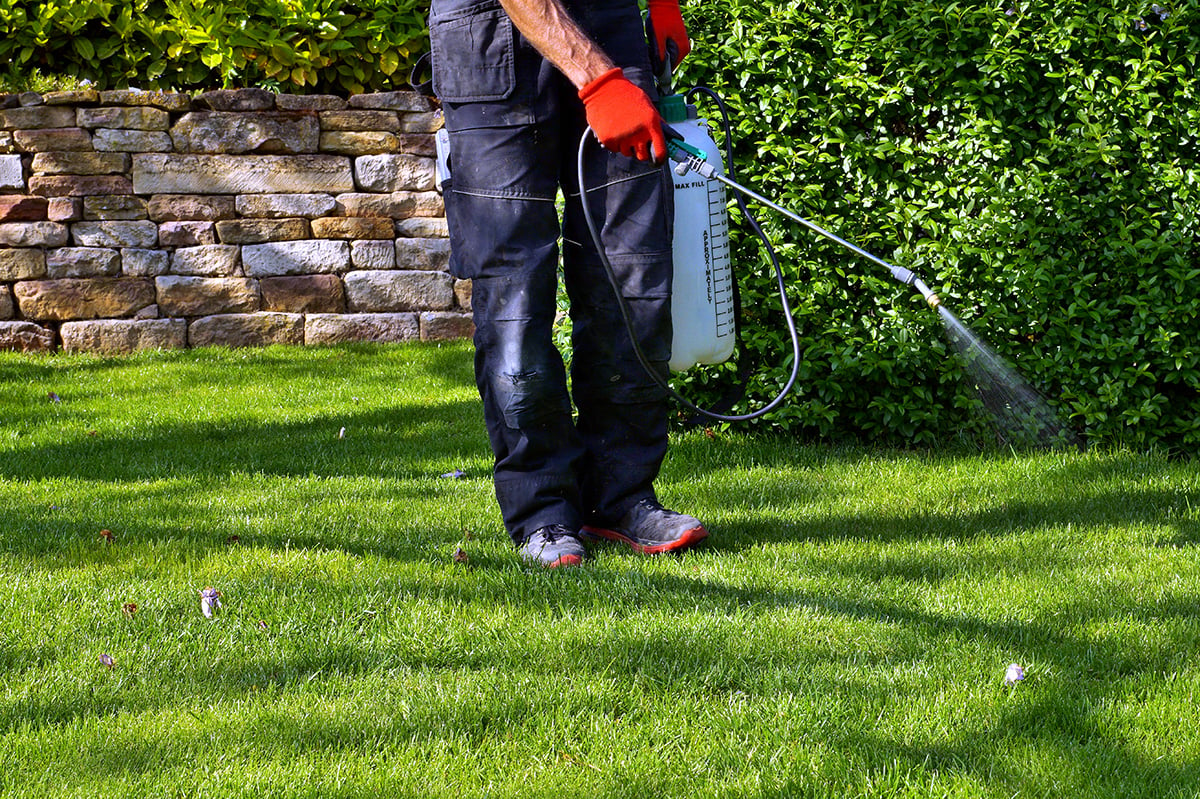As the warmer months of spring and summer approach, one of the main delights pet owners have is finally being able to enjoy the yard with their pets. Plus, you can use this time to do some fun gardening as well. But before you put on your gloves and hats, you should think about whether your pets will be adversely affected by the chemicals used in your garden. Is there a way to keep your yard weed-free but still be certain that your dog or cat is safe? We’ll explore the details below
 .
.
Is There Any Danger?
We’ll tell you right off the bat: thinking about whether pets can be harmed by lawn chemicals is not fear without basis in reality. While you don’t need to panic, you should still be careful. Statistics show that this sort of accidental poisoning does happen in people’s gardens - a fifth of all animal poisonings happen in the yard.
This might seem terrifying, but there’s no cause for alarm if you approach this problem in the right way. If you research what chemicals are dangerous for pets and which are not, you’ll know what to use and what to avoid completely. That way, you’ll be able to enjoy a beautiful garden and happy pets at the same time! Knowing what your garden essentials are will help you avoid a potentially tragic ordeal - so make sure that you inform yourself thoroughly!
What to Avoid
When you’re gardening, you are bound to resort to some sort of weed killer or another chemical from time to time. But if you have a dog, some of these are absolutely out of the question as they could seriously poison your furry pal, with even fatal consequences. With that in mind, we’ll take a look at some of the chemicals you should avoid if you’re keeping pets around.
Disulfoton Pesticides
In the past, regulations on pesticides and weed killers were far laxer than they are today. Luckily, plenty of chemicals that were actually harmful to both animals and people have been pulled from the US and global markets in the past few decades. Unfortunately, some of them are still around, and they present a potential risk for the pet owners.
A good example of this is disulfoton. That’s a type of pesticide belonging to the organophosphate group - one that’s pretty much banned across the world these days. But like we’ve said above, it’s still used in some plant-protecting chemical compounds. More specifically, you’ll likely find it in rose protectors.
As you might have already guessed, this is a chemical that’s very toxic for cats and dogs. The latter has an especially bad reaction to it, resulting in seizures, vomiting, and all kinds of trauma - sometimes even ending in death. Furthermore, disulfoton’s potency as dog poison is further heightened by the fact that dogs are naturally drawn to its scent. Anyone who’s dealt with the control of animal poisons is likely to tell you that dogs tend to eat it all of this chemical should they come across it.
What’s worse is that this often gets mixed up with bone meat and blood in fertilizers, making it even more appealing for the helpless canines. With that in mind, anyone owning a dog should definitely avoid this type of pesticide completely. On the off chance that you absolutely must spread it around your yard, take precautions to make sure your dog isn’t anywhere near the area and plants you’ve treated.
Additionally, this type of pesticide isn’t just dangerous when you use it on your lawn; it’s pretty unsafe around your household in general. If you’re going to store what’s left of these chemicals after use, you absolutely need to make sure that your dog can’t reach it. Find a dog-proof container and put it in a hard-to-access storage area.
Snail Bite
If you’ve got too many snails and slugs in your yard, you may resort to using bait to catch and get rid of them. However, avoid any kind of bait that contains metaldehyde. That kind of bait is known to produce seizures and tremors in dogs. If the intake is too big, it could even end in death. And tragically enough, just like with the previous lawn chemical we’ve discussed - dogs simply love it. We recommend using chemicals that are made with ferric phosphate instead, as they’re not nearly as toxic.
Herbicides
Compared to the slug bait and disulfoton that we’ve talked about, herbicides like Roundup aren’t as deadly dangerous. However, if dogs eat these, or weeds containing them - they will still experience some vomiting and discomfort.
You want to avoid this by keeping your dogs in the house while you use herbicides in the yard. Also, remove their food bowls and chewable toys, and pretty much anything you think they might lick or put their mouths on down the line.
Don’t worry, this doesn’t last a long while and soon enough, the yard will be dog-friendly once again. Wait for the plants to dry after dousing them with chemicals. Once that happens, the chemicals will have used the water to reach the plants’ root. At that point, the surface of the lawn is pretty much safe for cats and dogs. But even if your pets get uppity, remember that you need to make sure the coast is clear for them to play outside again; it’s better to withstand some annoyed barking indoors than risking your pets’ lives!
Conclusion
As you can see, knowing about lawn chemicals is important when you have pets. You may also want to give some organic and natural herbicides a try. For example, corn gluten meal is generally a better option compared to chemicals; it’s both safe for pets and effective at killing weeds. We hope this guide is of use for you and that you now feel more confident about your pet’s environment and safety. Stay safe, folks!




Let Us Know What You Thought about this Post.
Leave a comment below.